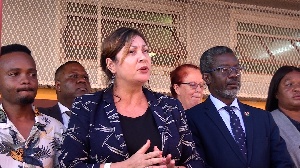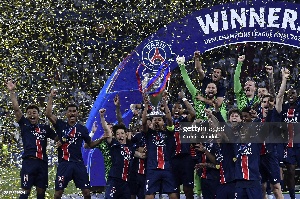Africa News of Thursday, 24 April 2025
Source: www.ghanawebbers.com
Namibia: Steenkamp Enters Khoekhoegowab Storm ... Says No Language Is Superior to Another
A storm is brewing at Auas Primary School in Katutura. Parents and community members are upset with the school's management. They allege that staff and principal Toini Nauyoma plan to remove the Khoekhoegowab (KKG) language from the school.
Education Minister Sanet Steenkamp has denied these claims. She stated that there will be no attempts to suppress any language in Namibia. Steenkamp emphasized that no language is superior to another.
The minister addressed concerns about removing a Khoekhoegowab class. She mentioned introducing an Oshikwanyama class instead. Parents worry that Nauyoma wants to stop teaching Khoekhoegowab, which most students speak.
During her visit, Steenkamp urged calm and promised a thorough investigation. She noted that since 2023, there have been over four meetings about preserving the KKG language. "There has been no removal of Khoekhoegowab from Auas Primary School," she added.
Steenkamp stressed the importance of not prioritizing one language over another. "As long as there are learners, we will find teachers and classrooms," she said.
An independent task team will investigate the situation at the school. Activist Shaun Gariseb submitted a petition highlighting educational requirements for state schools. He pointed out that schools must serve all learners without discrimination, as per the Basic Education Act.
Gariseb emphasized that indigenous languages are vital for self-concept and identity formation. He explained how language shapes ideas about oneself and others within social contexts.
There is widespread outrage over the alleged removal of Khoekhoegowab across Namibia. The Auas Primary School is located in an area where many people speak this language.
Nauyoma reportedly made similar changes at Groot Aub Primary School, removing Khoekhoegowab there too. Critics claim these actions were taken without following proper procedures.
Gariseb accused Nauyoma of making derogatory comments about Damara/Nama children. Since 2018, he noted, Khoekhoegowab classes have only had acting teachers while head positions remain frozen.
"We raised our concerns publicly," Gariseb said. "The principal believes our issues will disappear." He criticized recent job postings for Oshikwanyama teachers despite ongoing concerns about KKG classes.
He claimed this shows a systematic effort to replace Khoekhoegowab with other languages. Some teachers feel victimized and fearful when questioning school authority.
Other allegations include mismanagement of funds and unnecessary office renovations at the school. Gariseb argued this leads to unemployment among KKG teachers due to frozen head positions.
"It’s not surprising that the minister defends this; she has been silent for five years," he said. Protesters demand protection for minority languages and their teachers from victimization and unemployment.
"Our Khoekhoegowab cannot be erased by personal agendas," reads part of their petition. It warns that future generations will suffer if KKG disappears as a first language spoken at home.
Steenkamp maintained every school serves its community's children well. At Auas Primary School, she reported 500 Afrikaans-speaking children, 236 KKG speakers, and 148 Oshikwanyama speakers enrolled.
"We make provision for all children," she concluded, urging against using terms like "removal" regarding languages taught at schools.











